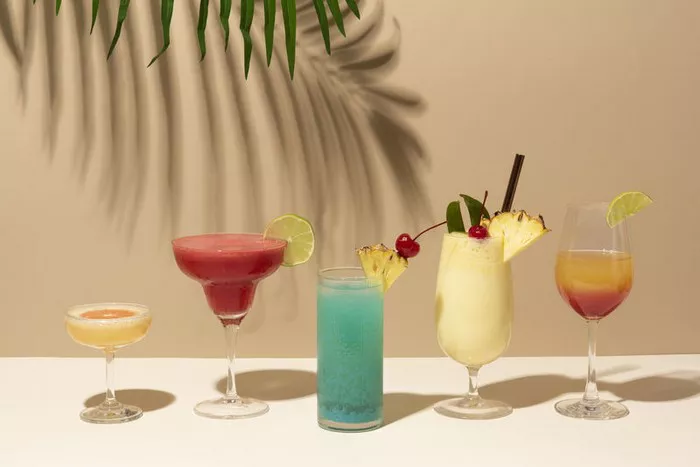When it comes to crafting the perfect cocktail, selecting the ideal alcohol is paramount. The question of “what alcohol is best for cocktails” is multifaceted, encompassing various spirits, each with unique flavors and characteristics that contribute to the overall taste profile of a drink. Understanding the diverse range of spirits available and their suitability for different cocktails is crucial for mixologists and cocktail enthusiasts alike.
Vodka: A Versatile Foundation
Vodka stands out as a versatile base for many cocktails due to its neutral flavor profile. Its clean taste allows other ingredients to shine, making it an excellent choice for a wide array of mixed drinks. Classic cocktails such as the Moscow Mule and Bloody Mary rely on vodka for their base, showcasing its adaptability in both refreshing and savory concoctions. Its ability to blend seamlessly with various mixers makes it a staple in bars worldwide, answering the query of what alcohol is best for cocktails that require a neutral base.
Gin: A Botanical Elixir
Gin, renowned for its distinctive herbal and botanical notes, offers a unique flavor profile that elevates cocktails. Infused with juniper berries and other botanicals, gin brings a complex and aromatic quality to mixed drinks. Cocktails like the classic Martini and Gin and Tonic heavily rely on gin, allowing its nuanced flavors to shine through. The diversity of gin styles, from London dry gin to floral and citrus-infused variations, broadens its application, making it an excellent choice for those seeking depth and character in their cocktails.
Rum: A Taste of the Tropics
Hailing from the Caribbean, rum adds a touch of tropical sweetness to cocktails. Distilled from sugarcane or molasses, rum offers a spectrum of flavors, from light and crisp to rich and robust. Cocktails like the Mojito and Piña Colada thrive on the distinct sweetness and depth that rum brings. The versatility of rum, available in white, dark, spiced, and aged variations, ensures its compatibility with an extensive range of cocktail recipes, answering the question of what alcohol is best for cocktails with a hint of the tropics.
Tequila: Vibrant and Fiery
Tequila, originating from Mexico, infuses cocktails with its bold and vibrant character. Made from the blue agave plant, tequila offers earthy and herbaceous undertones, providing depth to mixed drinks. Margaritas, with their tangy and citrusy profile, owe their essence to tequila, showcasing its ability to stand out in cocktails. The distinct types of tequila—blanco, reposado, and añejo—offer varying levels of complexity, catering to different cocktail preferences and reinforcing tequila as a preferred choice in mixology.
Whiskey: Elegance in Complexity
Whiskey, a diverse category encompassing bourbon, rye, Scotch, and more, brings depth and complexity to cocktails. Each variant offers its distinct flavor profile, from the sweetness of bourbon to the spiciness of rye and the smokiness of Scotch. Cocktails like the Old Fashioned and Whiskey Sour rely on whiskey as their foundation, highlighting its rich and robust taste. The nuanced characteristics of different whiskey types allow mixologists to create a wide array of cocktails, answering the query of what alcohol is best for cocktails with a touch of sophistication.
Brandy: Elegance and Refinement
Brandy, derived from fermented fruit juices, particularly grapes, exudes elegance and refinement in cocktails. Its smooth and rich profile, often with notes of dried fruits and spices, adds depth to mixed drinks. Classics such as the Sidecar and Brandy Alexander depend on brandy for their luxurious and sophisticated taste. The diverse range of brandies, including Cognac and Armagnac, each with its unique aging process and flavor profile, offers versatility in cocktail creation, making brandy a favored choice among connoisseurs.
Liqueurs: Flavor Enhancers
Liqueurs, though not primary spirits, play a pivotal role in cocktail-making by imparting distinct flavors and sweetness. These flavored spirits, such as Cointreau, Grand Marnier, and Amaretto, complement cocktails by adding depth and complexity. They serve as modifiers, enhancing the taste and aroma of mixed drinks like the Margarita or the Cosmopolitan. Bartenders often use liqueurs to add a unique twist to classic cocktails, expanding the possibilities of what alcohol is best for cocktails beyond the primary spirits.
Conclusion
In the realm of mixology, the choice of alcohol significantly influences the flavor, aroma, and overall experience of a cocktail. The question of “what alcohol is best for cocktails” doesn’t have a singular answer but rather encompasses a diverse spectrum of spirits, each contributing its unique characteristics to mixed drinks. Vodka’s neutrality, gin’s botanical complexity, rum’s tropical sweetness, tequila’s vibrant nature, whiskey’s depth, brandy’s refinement, and liqueurs’ flavor-enhancing properties collectively offer an extensive palette for crafting exquisite cocktails.
Understanding the diverse characteristics of different spirits enables mixologists and cocktail enthusiasts to create an array of libations, catering to varied tastes and preferences. Experimentation with various alcohols and their combinations allows for the development of innovative and tantalizing cocktails, further enriching the art of mixology. Ultimately, the best alcohol for cocktails depends on the desired flavor profile, the drinker’s preferences, and the creative vision of the mixologist, ensuring an ever-evolving and delightful world of cocktail creations.


